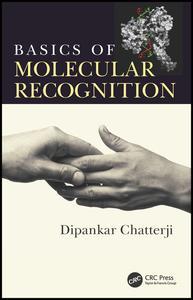Basics of Molecular Recognition
Auteur : Chatterji Dipankar

Basics of Molecular Recognition explores fundamental recognition principles between monomers or macromolecules that lead to diverse biological functions. Based on the author?s longtime courses, the book helps readers understand the structural aspects of macromolecular recognition and stimulates further research on whether molecules similar to DNA or protein can be synthesized chemically.
The book begins with the types of bonds that participate in the recognition and the functional groups that are capable of forming these bonds. It then explains how smaller molecules select their partners in the overall recognition scheme, offering examples of specific recognition patterns involving molecules other than nucleic acids. The core of the book focuses on macromolecular recognition?the central dogma of molecular biology. The author discusses various methods for studying molecular recognition. He also describes how molecules without biological functions can be arrayed or folded following certain rules and examines the nature of interactions among them.
Molecular recognition is a vast area encompassing every aspect of biology. This book highlights all aspects of non-covalent macromolecular recognition processes, including DNA?protein recognition and sugar?protein recognition.
Features of Interacting Monomers with Different Functionalities: What Drives the Binding? Molecular Recognition among Various Monomers. Macromolecular Recognition. Methods to Follow Molecular Recognition. Macromolecular Assembly and Recognition with Chemical Entities. Suggested Readings. Index.
Dipankar Chatterji is a professor in the Molecular Biophysics Unit at the Indian Institute of Science, Bangalore. Dr. Chatterji was the president of the Indian Academy of Sciences from 2013 to 2015. His major area of research focuses on the regulation of gene expression in bacteria under stress, including important pathways such as stringent response and quorum sensing.
Date de parution : 04-2016
15.2x22.9 cm
Thèmes de Basics of Molecular Recognition :
Mots-clés :
IgG Type; Helix Turn Helix Motif; Macromolecules; Antigen Antibody Association; Non-covalent interactions; DNA Metal Complex; DNA base pairs; DNA Protein Complex; Protein folding; Satellite DNA; Host-Guest recognition; Electron Rich Donor; sugar-protein recognition; Aromatic Stacking Interaction; DNA–protein recognition; DNA Double Helix; monomers; RNA Polymerase; DNA Protein Recognition; Free DNA; Molecular Recognition; Base Pairs; H3N Coo; Ziegler Natta Catalyst; DNA Helix; Drug Receptor Interaction; Ion Exchange Chromatography; DNA Mimic; Forming Hairpin Loops; PAUL EHRLICH; Active Repressor Protein; Nucleic Acid Bases; RNA Polymerase Active Site



